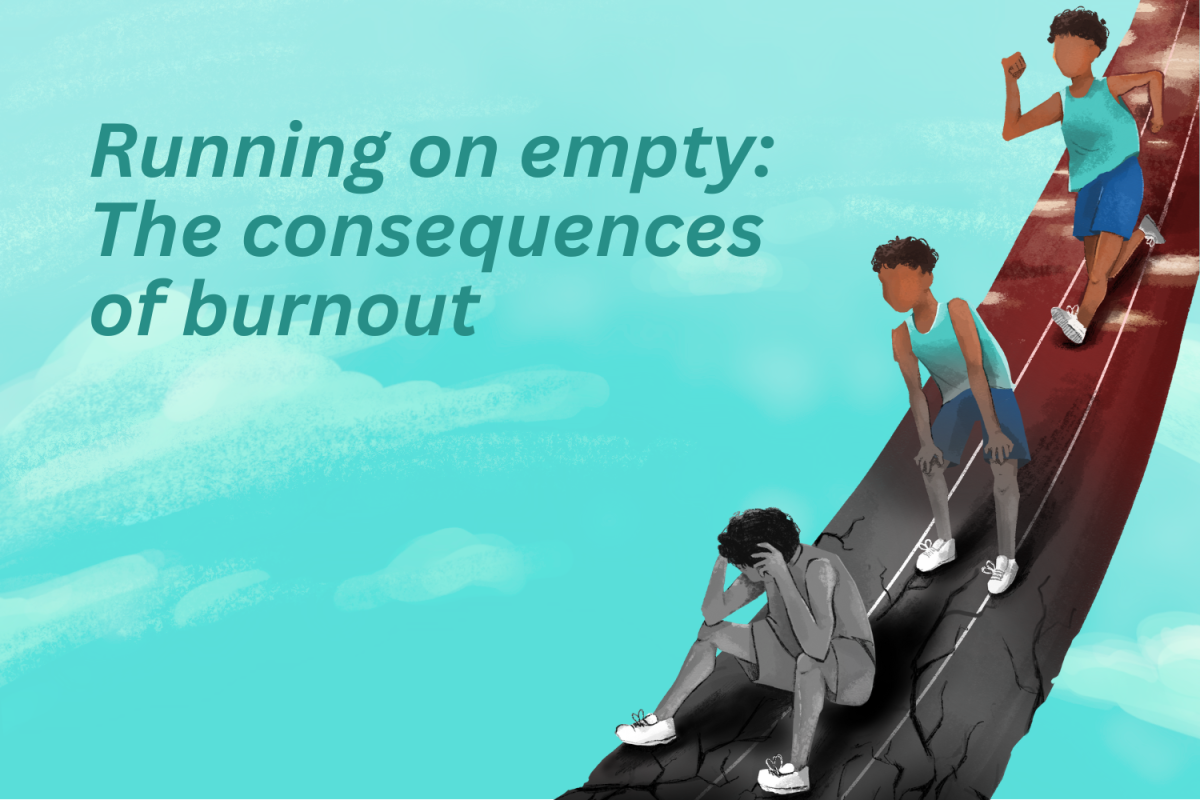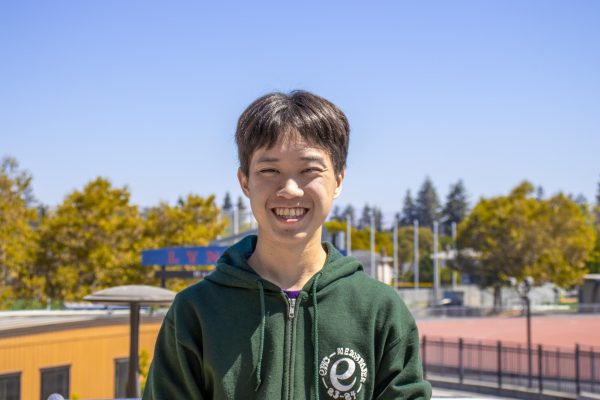7 a.m. — wake up. 8 a.m. — go to school. Lunch — complete some homework. 4 p.m. to 6 p.m. — school sports practice. 7 p.m. to 9:30 p.m. — club practice. On the drive there, eat dinner. On the drive back, take a quick nap. 10 p.m. — start studying. 1 a.m. — go to bed. 7 a.m. — wake up. Although intensive, these types of schedules are common for student athletes. Dedicated to both academics and their sport, many student athletes juggle school work and practice daily, often sacrificing time with friends or sleep — and as a result, face burnout.
According to Psychology Today, burnout is a state of emotional, mental and often physical exhaustion resulting from prolonged or repeated stress. Burnout occurs in various professions for a variety of reasons; however, it most commonly occurs among those who work in stressful environments and feel overwhelmed by their responsibilities.
Student athletes, in particular, oftentimes have to deal with both. They juggle hours of school work along with a rigorous amount of hours dedicated to the sport, all alongside external pressure from both parents and coaches. This relentless cycle of practices, games and academic responsibilities leaves little to no time for relationships or adequate breaks. Without the ability and time to rest or recover, student-athletes can feel chronically overloaded and overwhelmed — and in some cases, exhausted from the sport they originally loved.
“High schoolers are often experiencing burnout for the first time, so they don’t necessarily handle it properly,” Athletic Trainer Scott Leveau said. “College athletes often have already gone through high school sports so they already have an experience of it. High school sports act as a trial period to balance your work and social life.”
To consider a specific physical and mental state as being burnout, three main aspects need to be present: exhaustion, cynicism and feelings of reduced ability. Athletes, in particular, experience burnout at a rate between six to 11 percent as reported by the National Institute of Health with the harsh workload and difficult work-life balance being especially hard to maintain.
“A lot of athletes dedicate their lives to their sport, and after constant practices and games without breaks, they expect to continuously improve,” sophomore Jessie Zhu said. “When they are at a point where they don’t feel like they are getting better even after all the work they put into it, they feel like they are failing and become exhausted, increasing the chances of them wanting to give up.”
In addition to the academic and social commitments that student athletes face, they must devote a substantial amount of time to improve their skills and attend training sessions and competitions. These practices, along with the normal stress associated with school life, may increase a student athlete’s risk of experiencing both physical and mental issues that affect their overall health and wellness. Similarly, student athletes face an enormous amount of pressure from their school teachers, coaches and parents. Teachers expect them to maintain their grades and complete all their work; coaches expect them to dedicate themselves solely to their sport and perform well at games; parents expect them to do well at games and get good grades, all while having time to do chores and sleep at a healthy time. Facing all these expectations is extremely stressful for student athletes, and while they are trying to complete all these tasks, they lose time with their friends or breaks and become tired of the somewhat monotonous routine.
“A lot of pressure comes from coaches and parents, but at the same time, they are also very supportive and oftentimes just want to see you succeed,” junior Chloe Chan said. “For me, the main source of pressure comes from myself and the fact that I want to see myself constantly improve, but student athletes need to understand that everyone has their own limits. Taking themselves away from the moment and making time for new hobbies are especially important.”
However, the busy schedule is not the only factor that contributes to student-athlete burnout; nutrition and sleep are significant factors that could improve or worsen one’s mental state. For athletes, often exposed to high-intensity training, sleep is recognized as the most important method for physiological and psychological recovery. According to a study done by Lucio A. Cunha and Julio A. Costa, elite athletes reported approximately eight hours of sleep per night to feel rested. Due to sports and non-sport-related factors, these athletes often sleep less than seven hours, affecting their performance and mental health. For example, the study showed that runners and judo athletes who only had four hours of sleep the night before had negatively impacted endurance performance and muscle strength. A night with partial sleep restriction also affects athletes’ motor skills that require an increased amount of cognitive focus, such as goalkeepers and tennis players. Moreover, when already on the verge of burnout, student athletes who do not perform as well tend to lose more interest in the sport and eventually quit.
Similarly, nutrition is becoming an area of increased interest concerning athlete sleep and recovery. An athlete’s diet depends on several aspects, including the number of hours they practice, their goals and their environment. A healthy and balanced diet not only improves one’s performance but also mental health, due to its impact on brain function, hormones and neurotransmitters. Additionally, a 2019 review published in The American Journal of Clinical Nutrition found that increased fruit and vegetable consumption positively impacts psychological health, and daily vegetable consumption reduces symptoms of depression and alleviates feelings of exhaustion and cynicism. Athletes who eat a balanced diet and take proper breaks have decreased chances of experiencing burnout and improved performance during games and competitions.
Although commonly thought of as the same thing, stress and burnout are completely different. Stress is a temporary state of being that is a response to an environmental factor, while burnout is a mental or physical exhaustion caused by prolonged periods of stress or lack of rest. Despite common belief, stress is not always a hindrance; it can promote alertness and productivity. Burnout, on the other hand, does not have these qualities. Long-term effects of this stress lead to burnout which can lead to exhaustion, numbness and a lack of motivation or engagement.
Burnout results in a variety of side effects; however, these side effects are all synonymous with the general idea of exhaustion, anxiety and negative feelings for both the job and themselves. In reality, the side effects do not only affect one’s mental state; physical effects include gastrointestinal problems, high blood pressure, recurring headaches and sleep issues. High schoolers struggling with burnout suffer from a lack of motivation, the ability to focus and even declining grades.
“Students need to prioritize their own well being,” Assistant Professor of Kinesiology at San Jose State University Matthew Bejar said. “Prioritizing yourself doesn’t make you selfish, it helps everyone: your team, your schoolwork, it’s not a zero sum thing. By prioritizing self care and mindfulness, it makes all ships rise.”
Despite common misconceptions, burnout is common and happens regardless of age, profession and gender. One to nine percent of female student-athletes experience high levels of burnout and two to six percent of male student-athletes experience high levels of burnout according to the NCAA. However, not everyone experiences burnout to the same degree. Some individuals may be more resilient to burnout, while others may be susceptible due to various factors including overtraining and high workload.
Acknowledging individual differences and circumstances allows one to find more efficient ways to manage one’s burnout. Managing is not solely a matter of willpower or quick fixes; a weekend getaway or a spa day may provide temporary relief, but addressing burnout requires more sustainable changes in one’s lifestyle and boundaries.
“Taking the time to pamper yourself and take care of your needs is very important when facing burnout,” Zhu said. “These breaks can alleviate overwhelming feelings and help them find the motivation to continue their sport.”
For student-athletes, establishing clear boundaries between their sport, school and personal life can allow them to prioritize self-care and spend time with family and friends. To avoid losing interest in one’s sport and maintain physical and mental well-being, one should avoid excessive training without adequate recovery time or engage in cross-training or other activities to prevent monotony. This can help maintain their well-being without losing interest in the sport. It is also important to recognize that taking longer breaks can be helpful — giving time to experiment with other interests or rekindle a love for a sport will only enhance one’s mental resilience and overall enthusiasm for their sport and other commitments.
“The most important thing is for student athletes to be honest with themselves with how much they can handle,” junior Rhea Soni said. “They shouldn’t put too many things on their plate and should prioritize their relationships with not only their sport, but also their family and friends.”


































































